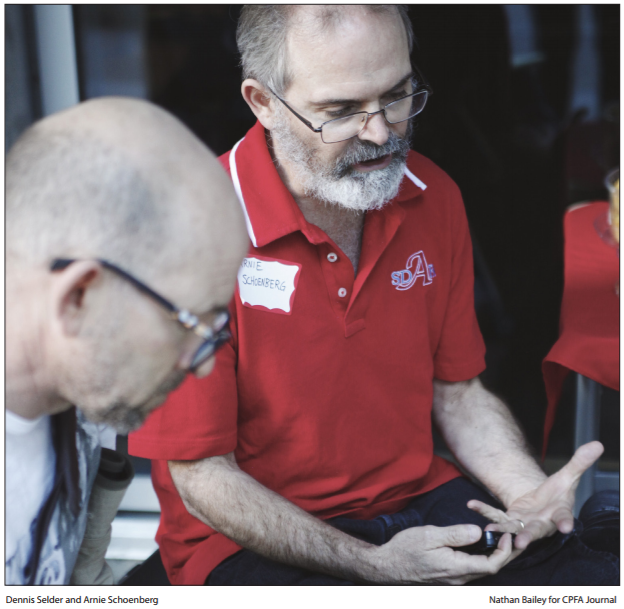
Interviewed by Dennis Selder (October 16, 2016)
What happened that motivated you to become a part-time activist? How has your life changed since becoming an activist?
I was an activist before I became a professor, so it just made sense to follow the old saying of “Think Globally, Act Locally”. I saw injustice and I’ve been organizing to try to fix it. I started in my Union, thinking that would be the logical place, but I didn’t get very far. They had me marching and phone banking for every issue BESIDES adjuncts. It took me a few years to realize that a wall-to-wall union that includes Chairs, and is run by full-timers, is always going to sell adjuncts out. So, now I’m doing what I can to democratize the Union, and working with SDAFA, and helping adjuncts where I can.
How has SDAFA allowed you to pursue your goals?
We are so isolated, it’s really alienating, it’s almost as bad as one of those work-at-home gigs. We don’t talk to each other, and when we do, half the time we’re made to fight with each other over who’s going get next semester’s classes, or who’s going to get the brass ring and get a full-time position. We make it so easy for them, the whole divide and conquer tactic of management, and the “company” unions, and the full-timers crying crocodile tears while cashing-in on our surplus labor.
We need a voice, not just to get our message out, but to talk to each other.
What is organizationally special about SDAFA?
The fact that it covers the entire county is very powerful. It lets us learn from other districts, and unions, we share problems and solutions. There’s strength in numbers.
What developments are exciting you right now in the part-time movement?
I don’t know, I’m not sure there are any. I don’t think you can call grassroots organizing exciting. It’s a long march. I don’t think we’ll see results until a decade from now, but if you wait a decade to start organizing then you’re not going see results until TWO decades from now, you gotta start sometime.
But what the fuck, prove me wrong, if you want to call for a revolution, I’ll join in!
What advice do you have for your fellow activists?
Laurie Anderson and Lou Reed came up with these three rules to live by:
One: don’t be afraid of anyone,
Two: get a really good bullshit detector, and
Three: is be tender, like, be nice to people.
When I heard first heard those I was going through some of the worst bullshit that an adjunct activist could face, I had been backstabbed by my Union leaders, I was totally isolated, and it made me afraid and angry. So I took these rules to heart, to see through the bullshit, the lies they tell us with straight faces, the dissimulations, the hypocrisies, the threats, but to be not afraid. It’s so hard. It helps to look at other political struggles and their consequences, like if you were fighting for pay-parity in Aleppo right now, you would look at our situations and realize we have nothing to be afraid of. I don’t mean to minimize our struggle, I take it very seriously, I just can’t take the fear seriously. I mean the worst thing that can happen to us is that we get fired, and we finally get off our asses and find real jobs. We have nothing to lose but our Tentative Assignment Offers. Sorry, I don’t really have any original advice. Thinking of tenderness, reminds me of one of my favorite Che quotes: “Hay que endurecerse, pero sin perder la ternura jamás.” Like, we all need to take this more seriously, but not so seriously that we lose our tenderness. I keep a strict firewall between the resentment I feel about the injustice that adjuncts face, and the tenderness I have towards my students who are trying to learn. Don’t get me wrong, I bring adjunct issues into the classroom from day one, but I just check the frustration and resentment at the door. I think that’s how I keep from burning out.
